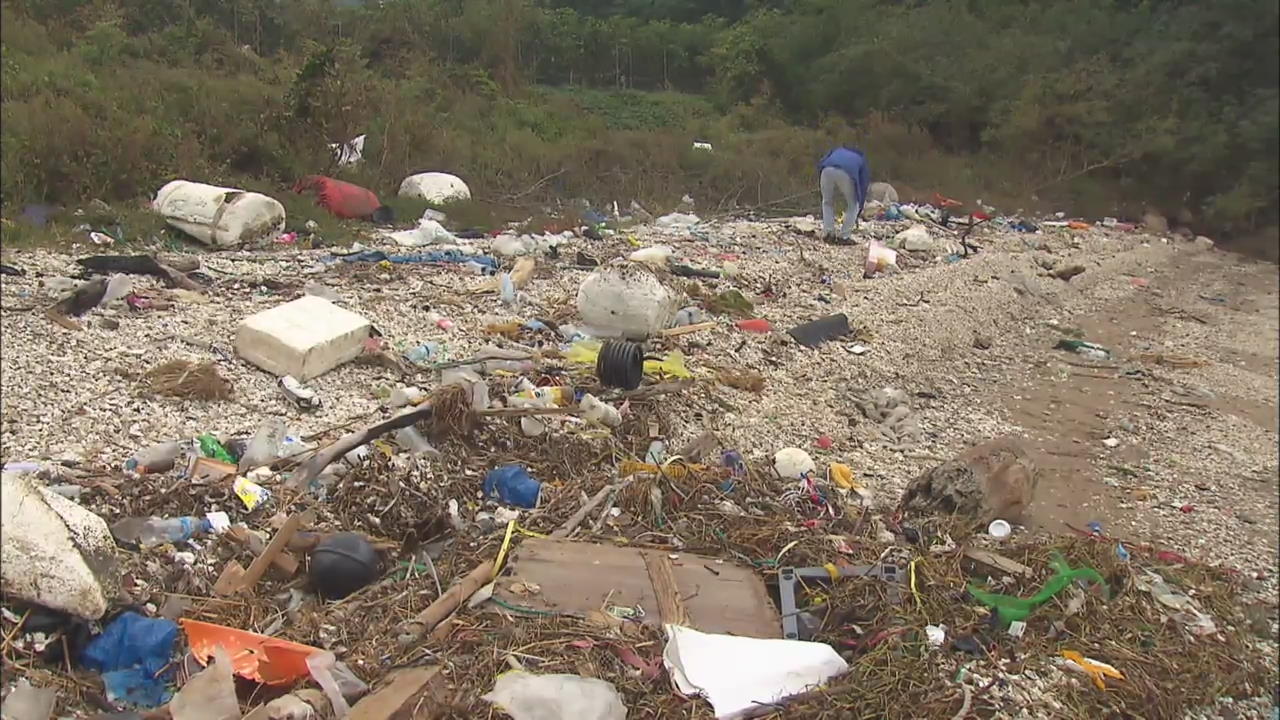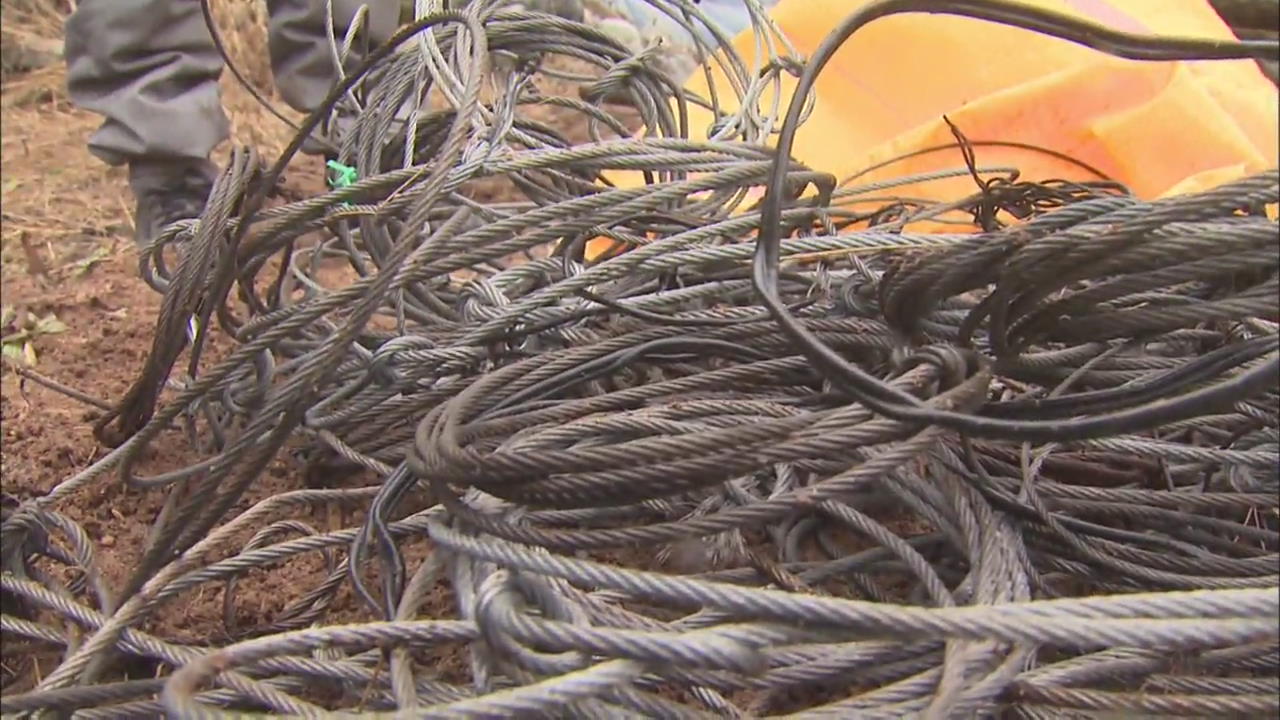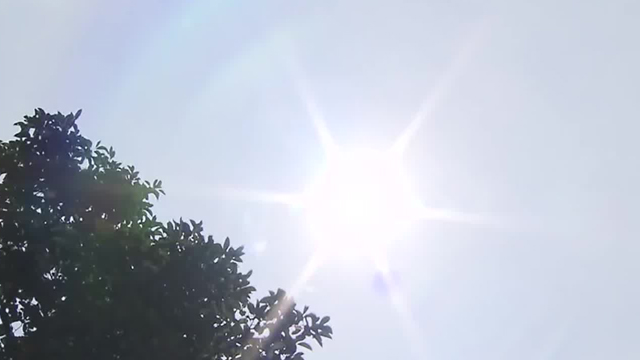Marine Debris
입력 2019.02.20 (15:29)
수정 2019.02.20 (15:51)
읽어주기 기능은 크롬기반의
브라우저에서만 사용하실 수 있습니다.
[Anchor Lead]
The sea off Jeollanam-do Province, which used to be one the cleanest areas in Korea, is having a hard time recently because of tons of marine debris. With local authorities being able to process only half of the trash, the risk of marine pollution keeps growing.
[Pkg]
Uido Island in Sinan-gun County is known for its scenic sandy beach. But these days it is covered with piles of marine litter. They include discarded fishing nets and large pieces of Styrofoam. Every year, 26,000 tons of ocean trash is washed ashore in Jeollanam-do Province. But local authorities can process only half of it due to enormous costs involved. It costs twice as much to process Marine litter compared to regular trash, because it must be transported by ships. Oftentimes, collected ocean trash ends up being left on the beach. Plans to install facilities for processing marine debris on major islands have produced no results in nearly a decade. That's because local residents are opposed to the plan, as authorities have presented no measures to prevent pollution at fish farms that may be caused by trash processing facilities.
[Soundbite] Yoo Young-eop(Island Development Research Center) : "We need facilities for recycling recyclable and re-usable items and processing trash that must be processed. But we don't have such facilities."
What used to be one of the cleanest areas in the nation is now turning into piles of ocean trash as authorities have failed to come up with any solutions.
The sea off Jeollanam-do Province, which used to be one the cleanest areas in Korea, is having a hard time recently because of tons of marine debris. With local authorities being able to process only half of the trash, the risk of marine pollution keeps growing.
[Pkg]
Uido Island in Sinan-gun County is known for its scenic sandy beach. But these days it is covered with piles of marine litter. They include discarded fishing nets and large pieces of Styrofoam. Every year, 26,000 tons of ocean trash is washed ashore in Jeollanam-do Province. But local authorities can process only half of it due to enormous costs involved. It costs twice as much to process Marine litter compared to regular trash, because it must be transported by ships. Oftentimes, collected ocean trash ends up being left on the beach. Plans to install facilities for processing marine debris on major islands have produced no results in nearly a decade. That's because local residents are opposed to the plan, as authorities have presented no measures to prevent pollution at fish farms that may be caused by trash processing facilities.
[Soundbite] Yoo Young-eop(Island Development Research Center) : "We need facilities for recycling recyclable and re-usable items and processing trash that must be processed. But we don't have such facilities."
What used to be one of the cleanest areas in the nation is now turning into piles of ocean trash as authorities have failed to come up with any solutions.
■ 제보하기
▷ 카카오톡 : 'KBS제보' 검색, 채널 추가
▷ 전화 : 02-781-1234, 4444
▷ 이메일 : kbs1234@kbs.co.kr
▷ 유튜브, 네이버, 카카오에서도 KBS뉴스를 구독해주세요!
- Marine Debris
-
- 입력 2019-02-20 15:37:41
- 수정2019-02-20 15:51:32

[Anchor Lead]
The sea off Jeollanam-do Province, which used to be one the cleanest areas in Korea, is having a hard time recently because of tons of marine debris. With local authorities being able to process only half of the trash, the risk of marine pollution keeps growing.
[Pkg]
Uido Island in Sinan-gun County is known for its scenic sandy beach. But these days it is covered with piles of marine litter. They include discarded fishing nets and large pieces of Styrofoam. Every year, 26,000 tons of ocean trash is washed ashore in Jeollanam-do Province. But local authorities can process only half of it due to enormous costs involved. It costs twice as much to process Marine litter compared to regular trash, because it must be transported by ships. Oftentimes, collected ocean trash ends up being left on the beach. Plans to install facilities for processing marine debris on major islands have produced no results in nearly a decade. That's because local residents are opposed to the plan, as authorities have presented no measures to prevent pollution at fish farms that may be caused by trash processing facilities.
[Soundbite] Yoo Young-eop(Island Development Research Center) : "We need facilities for recycling recyclable and re-usable items and processing trash that must be processed. But we don't have such facilities."
What used to be one of the cleanest areas in the nation is now turning into piles of ocean trash as authorities have failed to come up with any solutions.
The sea off Jeollanam-do Province, which used to be one the cleanest areas in Korea, is having a hard time recently because of tons of marine debris. With local authorities being able to process only half of the trash, the risk of marine pollution keeps growing.
[Pkg]
Uido Island in Sinan-gun County is known for its scenic sandy beach. But these days it is covered with piles of marine litter. They include discarded fishing nets and large pieces of Styrofoam. Every year, 26,000 tons of ocean trash is washed ashore in Jeollanam-do Province. But local authorities can process only half of it due to enormous costs involved. It costs twice as much to process Marine litter compared to regular trash, because it must be transported by ships. Oftentimes, collected ocean trash ends up being left on the beach. Plans to install facilities for processing marine debris on major islands have produced no results in nearly a decade. That's because local residents are opposed to the plan, as authorities have presented no measures to prevent pollution at fish farms that may be caused by trash processing facilities.
[Soundbite] Yoo Young-eop(Island Development Research Center) : "We need facilities for recycling recyclable and re-usable items and processing trash that must be processed. But we don't have such facilities."
What used to be one of the cleanest areas in the nation is now turning into piles of ocean trash as authorities have failed to come up with any solutions.
이 기사가 좋으셨다면
-
좋아요
0
-
응원해요
0
-
후속 원해요
0












![[속보] 심우정 검찰총장 “형사사법시스템, 국가 <br>백년대계로 설계 돼야”](/data/layer/904/2025/07/20250702_r3BkPK.jpg)




이 기사에 대한 의견을 남겨주세요.